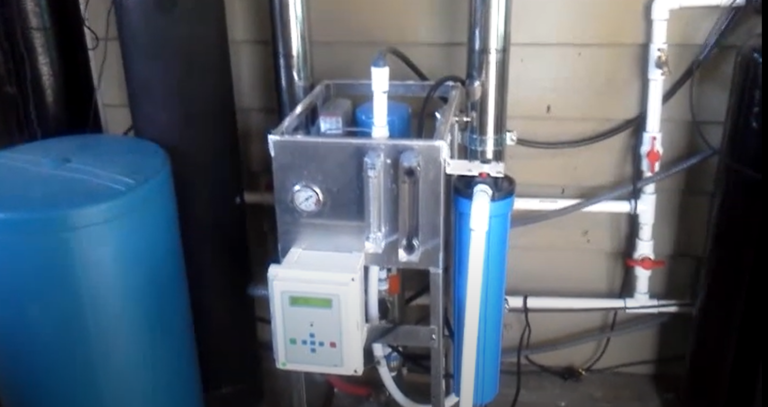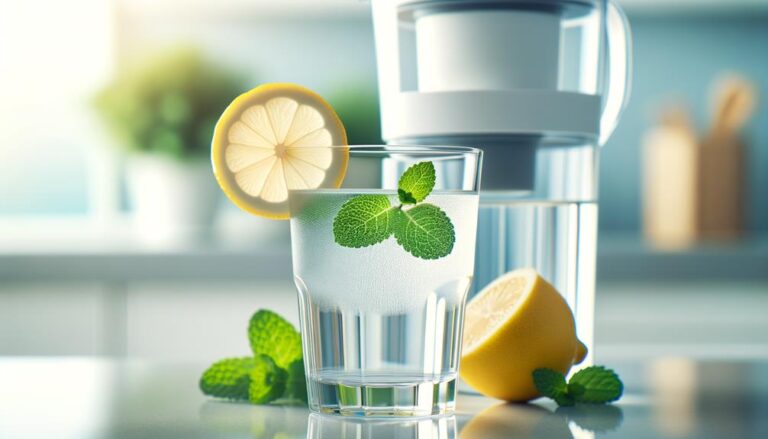Benefits of Water Filters: Enhance Coffee and Tea Flavor
When you use a water filter, you can significantly enhance the flavor of your coffee and tea. Water filters remove impurities and minerals that affect taste, resulting in a cleaner and more balanced beverage experience. You’ll achieve better flavor balance by reducing bitterness and acidity, allowing subtle flavors to shine. With a water filter, you can prevent limescale buildup and reduce waste, saving you money on coffee and tea. As you further explore the benefits of water filters, you’ll discover how this simple solution can promote healthier beverage options and contribute to a more sustainable lifestyle.
Key Takeaways
- Water filters remove impurities and minerals affecting flavor, enhancing coffee and tea’s richness and balance.
- Removing calcium and magnesium ions leads to better flavor balance, reducing bitterness and acidity in coffee and tea.
- Water filters improve flavor clarity by reducing bitter compounds and lowering acidity, making every sip enjoyable.
- Filtration methods like reverse osmosis and activated carbon eliminate bitter compounds, improving taste and achieving a smoother flavor profile.
Better Tasting Coffee and Tea
A water filter can greatly improve the taste of coffee and tea by removing impurities and minerals that can affect flavor.
When you’re brewing coffee, filtered water allows the full flavor of the coffee beans to shine through, resulting in a richer and more balanced taste. The same applies to tea steeping—with filtered water, unwanted minerals or contaminants don’t overpower the subtle flavors of the tea leaves.
You might notice that your coffee and tea have a cleaner, more invigorating taste, which can enhance the overall experience of serving others.
Whether running a coffee shop, hosting a dinner party, or simply brewing a morning cup for your family, a water filter can make all the difference.
With better-tasting coffee and tea, you can show your guests or customers that you truly care about their comfort and satisfaction.
Removing Impurities and Contaminants
As you consider the benefits of water filters, you’ll want to understand the types of impurities that can be present in your water supply.
You’ll encounter a range of contaminants, from naturally occurring substances like heavy metals and minerals to man-made pollutants like pesticides and pharmaceuticals. These contaminants can originate from various sources, including industrial runoff and agricultural activities.
Types of Water Impurities
Numerous impurities and contaminants, including dissolved solids, microorganisms, and inorganic compounds, are commonly found in untreated water, which can pose significant health risks to consumers. When serving others, it’s vital to provide them with clean drinking water that meets high standards of water quality.
You need to know what impurities can be present in your water supply. Dissolved solids, for instance, can affect your water’s mineral content and taste. Microorganisms like bacteria, viruses, and protozoa can cause waterborne diseases. Inorganic compounds like heavy metals and nitrates can have serious health consequences.
You should also be aware of other impurities, including particulate matter, organic compounds, and radioactive substances. Particulate matter can come from natural sources like soil and rocks or human activities like construction and mining. Organic compounds can be byproducts of human activities like agriculture and industry. Radioactive substances can be naturally occurring or man-made.
Understanding these types of water impurities is essential for providing safe and clean drinking water to those you serve. By knowing what’s in your water, you can take steps to improve its quality and protect public health.
Common Contaminant Sources
Your water supply can be contaminated by various sources, including nearby industrial sites, agricultural runoff, and aging infrastructure, which can compromise the quality of the water you serve. Identifying these contaminant origins is essential to guarantee the water you provide is safe and clean.
Industrial sites can release chemicals, heavy metals, and other pollutants into nearby water sources, while agricultural runoff can introduce pesticides, fertilizers, and sediment into the water. Aging infrastructure, such as corroded pipes, can leach lead, copper, and other metals into the water supply. Natural disasters, like floods and hurricanes, can contaminate water sources.
Understanding the origins of contaminants and water sources is fundamental to removing impurities and contaminants. By identifying potential sources of contamination, you can take steps to prevent or mitigate the risks.
This knowledge will also help you choose the most effective water filtration method. By serving clean and safe water, you can protect the health and well-being of those you care about.
Filtration Methods Compared
Comparing filtration methods requires evaluating their ability to remove many impurities and contaminants from water, including dissolved solids, bacteria, viruses, and other inorganic and organic compounds.
You’ll want to consider each method’s effectiveness, filtration speed, maintenance requirements, and filter lifespan.
Here are four common filtration methods compared:
- Carbon Block Filters: These filters use activated charcoal to remove chlorine, lead, and volatile organic compounds (VOCs) from water. They’re relatively inexpensive and easy to maintain.
- Reverse Osmosis (RO) Filters: RO filters use a semipermeable membrane to remove dissolved solids, bacteria, and viruses from water. They’re highly effective but can be slow and require regular maintenance.
- Ceramic Filters: These filters use ceramic elements to remove bacteria, viruses, and parasites from water. They’re long-lasting and require minimal maintenance.
- UV Purification: This method uses ultraviolet light to kill bacteria, viruses, and other microorganisms. It’s often used in combination with other filtration methods.
When choosing a filtration method, consider your specific needs and priorities.
Follow maintenance tips and replace filters as needed to guarantee peak performance.
Reducing Bitterness and Acidity
When you use a water filter, you remove impurities and contaminants and reduce bitterness and acidity in your drinking water.
By employing various acidity reduction methods, such as reverse osmosis and activated carbon filtration, you can eliminate bitter compounds that affect the taste and odor of your water.
With these compounds removed, you achieve a better flavor balance, making drinking water more invigorating and enjoyable.
Acidity Reduction Methods
Employing an effective water filtration system can greatly reduce acidity and bitterness in drinking water by removing impurities and minerals that contribute to these unpleasant taste characteristics.
When you use filtered water in your coffee and tea brewing techniques, you’ll notice a significant improvement in flavor. The acidity impact of minerals like calcium and magnesium can be mitigated, resulting in a smoother and more balanced taste.
Here are some ways a water filter can reduce acidity:
- Neutralizes mineral content: Filters can remove minerals that contribute to acidity and bitterness, like calcium and magnesium.
- Removes impurities: Water filters can eliminate impurities, such as chlorine and heavy metals, that affect the taste of coffee and tea.
- Adjusts pH levels: Some filters can adjust the pH levels of your water, reducing acidity and creating a more neutral taste.
- Improving flavor profile: By removing impurities and minerals, filters can improve the flavor profile of your coffee and tea, making them taste more nuanced and balanced.
Bitter Compounds Removed
What bitter compounds do water filters remove to reduce bitterness and acidity in drinking water, and how do these compounds impact the taste of your coffee and tea?
When you brew coffee or tea, certain bitterness factors like calcium and magnesium ions can bring out unwanted bitter flavors.
These ions can also contribute to scale buildup in your coffee maker or tea infuser, which can further impart bitter tastes to your beverages.
Flavor Balance Achieved
Water filters help you achieve a better flavor balance in your coffee and tea by removing calcium and magnesium ions. They reduce bitterness and acidity that can overpower the more subtle flavor notes.
This enhanced flavor balance allows you to experience the full range of flavors in your coffee and tea, creating a more satisfying sensory experience for yourself and those you serve.
Here are four key ways that water filters contribute to a more balanced flavor:
- Reducing bitter compounds: Water filters decrease the bitterness of coffee and tea by removing calcium and magnesium ions, allowing the more subtle flavors to shine through.
- Lower acidity: Water filters also reduce acidity, creating a smoother, more rejuvenating taste experience.
- Improving flavor clarity: With fewer minerals and impurities in the water, your coffee and tea flavors become clearer and more distinct.
- Enhancing flavor perception: By balancing the flavor of your coffee and tea, water filters enhance your overall flavor perception, making every sip a delight.
Preventing Limescale Buildup
When you install a water filter, it can greatly reduce the amount of minerals such as calcium and magnesium that contribute to limescale buildup in your plumbing and appliances. This is especially important in areas with hard water, where mineral deposits can cause scaling and damage to your equipment.
By removing these minerals, a water filter helps prevent limescale buildup, which can lead to clogged pipes, reduced water pressure, and even appliance failure.
To maximize limescale prevention, it’s crucial to perform regular maintenance on your water filter. This includes replacing the filter cartridges as recommended, cleaning the filter housing, and checking the system for leaks or blockages.
Improved Flavor Profile
When you install a water filter, you’ll notice a significant improvement in the taste of your drinking water.
This is because impurities and contaminants are removed, allowing the natural flavor of the water to shine through.
As a result, you can enjoy pure water that not only quenches your thirst but also enhances the flavor of your favorite beverages and dishes.
Pure Water Matters
Drinking water that has been filtered to remove impurities and contaminants clearly improves its flavor profile, allowing you to taste the pure, invigorating quality of the water. By utilizing advanced filtration technology, you can considerably enhance the water quality in your home or business. This means that the water used in your coffee, tea, or other beverages is free from unwanted substances that can detract from their natural flavors.
The importance of pure water is evident in the following ways:
- Reduced impurities: Filtered water contains fewer impurities and contaminants, which can negatively impact the taste of your beverages.
- Improved taste: Pure water has a revitalizing, clean taste that complements the natural flavors of coffee and tea.
- Consistent flavor profile: Filtered water can achieve a consistent flavor profile in beverages, unaffected by fluctuations in water quality.
- Increased customer satisfaction: By serving coffee and tea made with high-quality, filtered water, you can guarantee that your customers enjoy the best possible taste experience.
Flavor Enhancing Results
Utilizing advanced water filtration systems enhances the flavor profile of your beverages by removing impurities and contaminants that can alter the taste. This allows you to serve coffee and tea with a more refined and consistent flavor.
By controlling water mineralization, you can bring out the ideal taste in your coffee and tea. Minerals like calcium and magnesium can affect the extraction of flavors from the coffee beans or tea leaves. With a water filter, you can adjust the mineral content to suit the specific coffee or tea you serve.
As a result, you’ll notice a significant improvement in taste perception. The flavors will be more nuanced and balanced, with a cleaner finish. Your guests will appreciate the attention to detail you’ve put into serving them the best possible cup of coffee or tea.
By investing in a high-quality water filter, you’re not only ensuring the health and safety of your guests but also elevating their overall dining experience.
With a refined and consistent flavor profile, you can build a loyal following of coffee and tea connoisseurs who appreciate your commitment to excellence.
Benefits for Iced Coffee
How does a water filter impact the flavor of your iced coffee? When you brew coffee with filtered water, you’ll notice a significant difference in taste. The filter removes impurities and minerals that can give your iced coffee a bitter or unpleasant flavor.
With a water filter, you’ll enjoy a smoother, more balanced flavor perfect for serving others.
Here are four ways a water filter can enhance the flavor of your iced coffee:
- Reducing bitterness: Filtered water eliminates impurities that can cause bitterness, resulting in a smoother flavor.
- Improving flavor profile: By removing minerals and impurities, a water filter allows the coffee’s natural flavors to shine through.
- Enhancing sweetness: A water filter makes the coffee’s natural sweetness more pronounced, creating a balanced flavor.
- Increasing invigorating quality: Filtered water makes your iced coffee more invigorating and revitalizing, perfect for serving on a hot day.
Healthier Hot Beverages
While a water filter can greatly enhance the flavor of your iced coffee, its benefits also extend to hot beverages. This allows you to brew hotter, healthier drinks free from contaminants and unwanted additives.
When you use filtered water, you’ll be able to extract the perfect amount of flavor and oils from your coffee beans or tea leaves. This results in a more balanced and satisfying taste experience.
In addition to improved flavor, using a water filter promotes healthier hot beverages. By removing impurities and contaminants, you’ll be serving drinks that aren’t only delicious and better for your customers’ health.
This is especially important if you prioritize sustainable sourcing and environmentally-friendly practices. Pair your filtered water with eco-friendly brewing techniques, such as pour-over or French press, to minimize waste and reduce your environmental footprint.
With a water filter, you can provide high-quality hot beverages that not only taste great but also align with your values of serving others and the environment.
Savings on Coffee and Tea
By filtering your water, you can greatly reduce the amount of coffee and tea you need to achieve the perfect brew, resulting in substantial cost savings over time. This is especially beneficial for households and businesses that consume large quantities of these beverages. With filtered water, you can enjoy more flavorful coffee and tea while using less of the actual product.
Here are some benefits of using filtered water for coffee and tea:
- Reduced coffee and tea consumption: Enjoy the perfect brew with less product, resulting in cost savings.
- Less waste: Use the amount of coffee and tea needed to reduce unnecessary waste.
- Budget-friendly options: Take advantage of cost-effective filter solutions that fit your needs and budget.
- Long-term savings: See significant savings over time by reducing your coffee and tea consumption and waste.
Environmentally Friendly Option
Filtered water offers an essential advantage over bottled water: it remarkably reduces your carbon footprint and reliance on single-use plastics. By choosing a water filter, you considerably decrease the amount of plastic waste generated by your daily hydration needs. This environmentally friendly option aligns with sustainability practices, promoting a healthier planet for future generations.
When selecting a water filter, consider eco-friendly materials that minimize environmental impact. Some water filters are designed with recyclable or biodegradable components, reducing waste.
You’ll also want to consider the filter’s maintenance and replacement requirements to guarantee they align with your sustainability goals.
Cost-Effective Solution
Your upfront investment in a water filter can lead to substantial long-term savings compared to buying bottled water, as it eliminates the ongoing expense of purchasing single-serving bottles.
When considering budget considerations, consider all the money you’ll save by not buying bottled water. With a water filter, you can enjoy clean drinking water without the hefty price tag.
Here are some key benefits of using a water filter:
- Reduced bottled water expenses: No more spending money on single-serving bottles of water.
- Lower maintenance costs: Water filters require minimal maintenance, and replacement parts are often inexpensive.
- Increased appliance longevity: By removing impurities and minerals from your water, you can extend the life of your appliances.
- Long-term savings: With a water filter, you can enjoy significant savings over time, making it a smart investment for your home or business.
Conclusion
As you savor the rich flavors of your filtered coffee and tea, imagine the impurities and contaminants as unwanted guests evicted from the party.
The bitterness and acidity, once uninvited crashers, are now kept at bay. The limescale buildup, a stubborn party foul, is prevented.
Your taste buds, the discerning hosts, welcome the refined flavors and healthier hot beverages.
With each sip, you’re saving money and the environment, a cost-effective solution that’s simply a matter of good taste.



